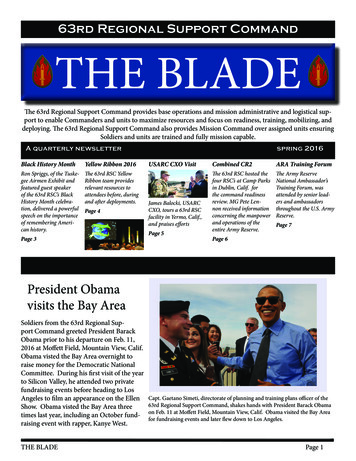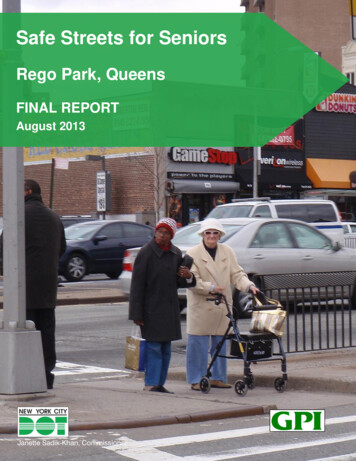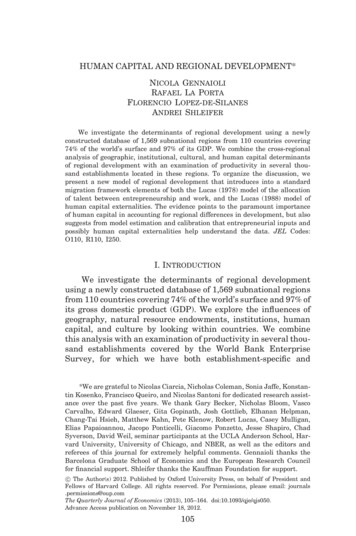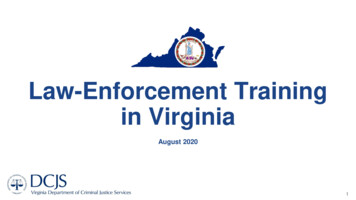
Transcription
63rd Regional Support CommandTHE BLADEThe 63rd Regional Support Command provides base operations and mission administrative and logistical support to enable Commanders and units to maximize resources and focus on readiness, training, mobilizing, anddeploying. The 63rd Regional Support Command also provides Mission Command over assigned units ensuringSoldiers and units are trained and fully mission capable.A quarterly newsletterBlack History MonthYellow Ribbon 2016Ron Spriggs, of the Tuskegee Airmen Exhibit andfeatured guest speakerof the 63rd RSC’s BlackHistory Month celebration, delivered a powerfulspeech on the importanceof remembering American history.The 63rd RSC YellowRibbon team providesrelevant resources toattendees before, duringand after deployments.Page 4Page 3USARC CXO VisitJames Balocki, USARCCXO, tours a 63rd RSCfacility in Yermo, Calif.,and praises effortsPage 5spring 2016Combined CR2ARA Training ForumThe 63rd RSC hosted thefour RSC’s at Camp Parksin Dublin, Calif. forthe command readinessreview. MG Pete Lennon received informationconcerning the manpowerand operations of theentire Army Reserve.The Army ReserveNational Ambassador’sTraining Forum, wasattended by senior leaders and ambassadorsthroughout the U.S. ArmyReserve.Page 7Page 6President Obamavisits the Bay AreaSoldiers from the 63rd Regional Support Command greeted President BarackObama prior to his departure on Feb. 11,2016 at Moffett Field, Mountain View, Calif.Obama visted the Bay Area overnight toraise money for the Democratic NationalCommittee. During his first visit of the yearto Silicon Valley, he attended two privatefundraising events before heading to LosAngeles to film an appearance on the EllenShow. Obama visted the Bay Area threetimes last year, including an October fundraising event with rapper, Kanye West.THE BLADECapt. Gaetano Simeti, directorate of planning and training plans officer of the63rd Regional Support Command, shakes hands with President Barack Obamaon Feb. 11 at Moffett Field, Mountain View, Calif. Obama visited the Bay Areafor fundraising events and later flew down to Los Angeles.Page 1
63rd Regional Support CommandUpcoming EventsGreetings!Our vision here at the 63d is to be“An indispensable, adaptive partnerenabling Commanders and units toprepare America’s Soldiers to fight,survive, and win our Nation’s wars.”Each of you play a critical role inensuring our units and Soldiersget the best support the 63d RSCcan provide. We exist to supportour customers so that our unitsand Soldiers can focus on missionreadiness in all aspects.Let us know what we are doingright and where we can improve.Let us know what we can do to helpyou and your fellow Army ReserveSoldiers to have the best resourceswe can offer them.Thank you all for your hard work inmaking our vision a reality.“Blood and Fire!”We Support!THE BLADEMarch 11-13 - Yellow Ribbon EventDallas, TXMarch 12 - RSO EventGrand Prairie, TXMarch 13 - Daylight Savings TimeMarch 17 - St. Patrick’s DayMarch 18-20 - Strong Bonds EventSan Antonio, TXMarch 22-24 - ASIST WorkshopCamp Parks, CAMarch 27 - Easter DayApril 5 - Gold Star Wives DayApril 9 - 63rd RSC Dining OutSan Jose, CAApril 9 - RSO EventTBDApril 12-14 - ASIST WorkshopAlburquerque, NMApril 15-17 - Strong Bonds EventRedondo Beach, CAApril 18 - Tax DayApril 22 - Earth DayGrand Prairie, TX63rd RSC, AFRCApril 22-24 - Yellow Ribbon EventAnaheim, CAMay 7 - RSO EventPhoenix, AZMay 8 - Mother’s DayMay 13-15 - Strong Bonds EventAnaheim, CAMay 17-19 - ASIST WorkshopCamp Pendleton, CAMay 20-22 - Yellow Ribbon EventLos Angeles, CAMay 30 - Memorial DayJune 10-12 - Strong Bonds EventDallas, TXJune 14 - Army BirthdayJune 17-19 - Yellow Ribbon EventDallas, TXJune 19 - Father’s DayJune 21-23 - ASIST WorkshopMesa, AZJune 25 - MG Tooliatos’ Change ofCommand Ceremony63rd RSC, AFRCJune 25 - RSO EventLittle Rock, ARJuly 4 - Independence DayJuly 15-17 - Strong Bonds EventSan Antonio, TXJuly 15-17 - Yellow Ribbon EventLos Angeles, CAJuly 26-28 - ASIST WorkshopGarden Grove, CAJuly 30 - RSO EventLubbock, TXAugust 6 - RSO EventSan Diego, CAAugust 19-21 - Strong Bonds EventAnaheim, CAAugust 23-25 -ASIST WorkshopMountain View, CAAugust 26 - Women’s Equality DayAugust 26-28 -Yellow Ribbon EventDallas, TXSept. 2-4 - Strong Bonds EventSan Diego, CASept. 9-11 - Yellow Ribbon EventAnaheim, CASept. 17 - RSO EventLas Vegas, NVSept. 20-22 - ASIST WorkshopSan Antonio, TXSept. 24 - Gold Star Families DayPage 2
63rd Regional Support CommandTLegacy of Tuskegee Airmen honored during Black History Month eventhe Tuskegee Airmen havelong been renowned forbeing the first black pilotsin U.S. military historyand are a focal point ofBlack History Month, held yearly everyFebruary.The legacy of the Tuskegee Airmenduring World War II has been toldthrough countless books and movies,cementing their place in black history,something ‘Uncle’ Ron Spriggs hasdedicated a significant portion of hislife to help preserve.Spriggs was guest speaker at the 63rdRegional Support Command’s BlackHistory Month Celebration, Feb. 10,at the headquarters auditorium, here,where he discussed the history of theairmen and his own role in ensuringtheir story is passed down to futuregenerations.Spriggs, an Air Force veteran andfounder of the Ron Spriggs Exhibit ofTuskegee Airmen (RSETA), said therehave been a lot of stories told about theairmen, but one that is often misunderstood.“You may have heard stories aboutthe Tuskegee Airmen never losing abomber under escort missions it’snot true,” Spriggs said. “It was provensix or seven years ago that there weresome losses, albeit very few, of bombers under the escort of the Tuskegeecrews.”Spriggs said this has been proven bythe Tuskegee Airmen National Organization and verified by Air Forcearchives in Montgomery, Ala., butdespite this they were still one of themost productive and proficient airsupport units during WWII.“Benjamin Davis Jr. was the commander of the operation and he literally putout orders that said they would notgo as pilots and chase a single planeTHE BLADE“I got a call from (Sen.) Mitch McConnell’s office in Kentucky who asked meif I wanted to attend. I was scheduledfor surgery that week, so I called mydoctor and said ‘pause,’” Spriggs saidwith a grin. “I was allowed the opportunity to observe, and I was as closeto President George (W.) Bush and allthose honored dignitaries as far as thesecond row.”to defeat that plane in aerial combat,”continued Spriggs.“The Tuskegee Airmen were in thesame vicinity as the fighters they wereescorting and when they left, it left ahole in the fabric of aerial coverage. Ifyou shoot down one enemy plane that’sjust one enemy pilot, but if anotherpilot sneaks in and shoots down abomber, that’s ten lives.”“Their job was to bring those airmenhome to their family and friends.”Spriggs said the airmen were highlydecorated and received 744 air medalsand should be recognized not primarily as black history, but Americanhistory.“I travel all over the country, doinglectures or workshops, and the majority of my audience are young, whitestudents,” Spriggs explained. “Quitefrankly our students need to hear thisstuff. The education system failed meway back 50 years ago and it’s stilldoing the same thing now because theTuskegee Airmen are not considered acore product.”“I snuck in - I was supposed to be inthe back somewhere. But they neededwheelchair pushers, so I grabbed oneof those chairs belonging to one of theairmen and watched as the nation paidtribute to these great men. That singlegold medal is now in the Smithsonian.”It was a proud moment, especiallyfollowing the treatment the TuskegeeAirmen received following their returnhome after WWII.“One of the airmen (Lt. Col. AlexanderJefferson) once told me he was treatedbetter by the Germans when he wastaken as a prisoner of war than byhis own folks at home,” Spriggs said.“When they realized he was an officerthey treated him with all amount ofrespect.”“When he was liberated and camehome and got off the boat, there wasa (white sergeant) holding two signs.One said ‘whites to the right and ‘colored to the left.’”“That was his homecoming. No bands,or kissing girls in the streets,” he said.“If not me then who will teach it? Itwill fall on your shoulders,” he said tothe audience.Having met over 200 verified TuskegeeAirmen, Spriggs said he’s heard a lot ofstories, but one of his best memorieswas attending the Congressional GoldMedal ceremony for the airmen in2007.Story and photographs by Alun ThomasPage 3
63rd Regional Support CommandT63rd RSC hosts first Yellow Ribbon experience of 2016he 63rd Regional Support Command Yellow Ribbon Programhosted their first eventof the year at the HiltonAnatole, Dallas, Jan. 1517, for both pre and post deploymentevents.The purpose of the event and theentire Yellow Ribbon Program is toprovide soldiers and their families withinformation, services, referrals andoutreach opportunities throughout theentire deployment cycle, said Daria Y.Mediano, the 63rd RSC chief of programs and services.“We connect attendees to local resources through informational briefings and community partners at ourevents,” Mediano said.University among others.“Community partners are a vital partof any [YRP] event and provide avariety of services, such as financialplanning, behavioral counseling, legalassistance, job referral programs andeducation benefits,” Olsen explained.Providing soldiers with informationthey will retain and use in the longterm future is critical, Mediano said.The 63rd RSC focuses on post-deployments in their events and strives toprovide relevant and engaging classesfor their attendees, said Emily Conely,the instructor manager of the event.As such, attendees have the option tochoose classes during the event, suchas savings and investing or behavioralhealth improvement, retirement services or how to manage one’s militarycareer and Covey’s 7 Habits or increasing mental resiliency.“At the 63rd RSC, we don’t just haveevents, our goal is to make an experience for our soldiers and their familiesto take back home,” she said.Story and photographs by Grace PakAttendees checked in on Jan. 15 toAdditionally, the 335th Sustainmentreceive agendas and information forthe weekend, and later dined togetherat the mandatory reception in the“At the 63rd RSC, we don’t just haveevening. In addition to serving as an events, our goal is to make an exicebreaker, the YRP team briefed theperience for our soldiers and theirattendees with an overview of thefamilies to take back home,”weekend.W. K. Jones, chief of the 63rd RSC’swellbeing division, emceed the reception and general sessions during theweekend and said the sessions areimportant events for attendees.“It is the nucleus for all operationswithin Yellow Ribbon as far as theattendees’ experience is concerned,”Jones said. “The general sessions helpattendees direct their attention on getting the most out of the event.”Command (Theater) hosted a jointevent in conjunction with the 63rdRSC for their pre-deployment attendees. Topics included in their curriculum covered Military OneSource, communication plans, safety and resilience,suicide prevention and behavioralhealth briefs.All events provide ample time for attendees to interact with communitypartners during the weekend, saidRena Olsen, a volunteer serving as thecommunity partner manager duringthe weekend’s event.Find Yellow Ribbon events atwww.yellowribbonevents.orgor contact the 63rd RSCYellow Ribbon team ttendees were able to ask questionsand gain contact information from avariety of resources such as Red Cross,Troops to Teachers, Navy FederalCredit Union, and American MilitaryTHE BLADEPage 4
63rd Regional Support CommandArmy Reserve leadership tours 63rd RSC facilitiesYERMO, Calif. - The 63rd RegionalSupport Command provides classservices and base operations supportto more than 45,000 Soldiers, familymembers and DoD civilians acrossseven states in the Western U.S. fromCalifornia to Arkansas.Battlefield circulations are a key wayfor leaders to improve communicationand enhance their situational awareness within a tactical environment. Thesame principle holds true for leadership of the U.S. Army Reserve who aimto better understand and serve personnel under their command.James Balocki, command executiveofficer, Office of the Chief of ArmyReserve, conducted such a visit whenhe toured multiple 63rd RSC facilitiesdispersed across four states, Jan 22-26.The tour was comprised of visitingArea Maintenance Support Activity,Equipment Concentration Sites andReserve Personnel Action Centersin Texas, New Mexico, Nevada andCalifornia, as Balocki met 63rd RSCpersonnel to find out what needs andimprovements can be made to enhanceTHE BLADEtheir workplaces.“The overall purpose of the trip was tomeet with and learn from our militarytechnicians in the 63rd RSC and findout the things we’re doing right andthe things we could do better,” Balockisaid. “Secondarily I wanted to see thefacilities we’re operating in and how wecan make the quality of life better forthose working in them.”Balocki said he was impressed with thefacilities he visited, with many rangingfrom brand new buildings to far olderones.“Some of the older ones are renovatedand what I saw tells me there’s thingswe can do, but we’ve made goodinvestments and they’re paying off forus,” he said.One of Balocki’s numerous visits wasto ECS 171 in the remote location ofYermo, which although austere, doesn’tnegate readiness, Balocki said.“We’ve got good leadership here, agood workforce quite frankly it’sexciting to see what they’re doing outhere,” Balocki continued. “My otherreason for coming to Yermo was because we’re trying to defend it as partof our military construction budget.”“How successful I am in trying to dothat on Capitol Hill or in The Pentagonreally depends on me having a firsthand view of the situation and conditions on the ground,” he added.Balocki praised the 63rd RSC for theircontinuing efforts and the leadership,which helps their facilities, run successfully.“This is a first-rate outfit that’s doing incredible work every one ofour RSC’s is a little different and the63rd RSC has the tyranny of distanceto cover everywhere from Californiato Texas,” Balocki said. “I’ve had thechance to see that up close and personal over the last few days and thecommand is doing incredible things.”“I’m really impressed with the talent,professionalism and skill I see and thededication shown every day,’ Balockisaid.Story and photograph by Alun ThomasPage 5
63rd Regional Support CommandRegional Support Commands gather for readiness reviewacross the board,” he said. “There aregoing to be nuances- we all understandthat. But wherever we can, we’re goingto work towards a common baseline.”Lennon asked each RSC to think aboutprogressive readiness, which is to plan,prepare and provide.“Plan to be part of the total force, foran operation or exercise.”“Prepare for the exercises: the RSCpiece of the prepare is to make sureyour Soldiers are ready to do whatthey have to do and are medically andadministratively cleared.”Leadership from the ArmyReserve gathered at CampParks, Dublin, Calif., Dec.8-9, for the Combined Regional Support CommandReadiness Review (CR2).The 63rd, 81st, 88th and 99th RSC’scommanding generals briefed Maj.Gen. Peter Lennon, deputy commanding general (support), U.S. ArmyReserve Command, about the currentstate of readiness of their respectiveRSC and where each sits in criticalareas of performance.“Part of the reason we’re doing allfour RSC’s together is to take the steptowards standardization, so the OFNT(Operational and Functional) commands that depend on us so muchunderstand they’re going to have oneway of doing things.”Having four separate procedures is notbeneficial long-term, Lennon continued.“We’re going to try and get processesand procedures that are standard“Provide those forces to the combatant commanders and turn a reserveSoldier into a mobilized active dutySoldier that is ready to roll.”Lennon said he wanted to come awayfrom the CR2 with ideas and conceptsthat will take the RSC’s to the nextlevel.“I have to make sure what we’re thinking about as far as moving forward,provides us with something we canexecute,” he added.“I’ll be your advocate along with theRSC commanders for any issues,” Lennon said.Story and photographs by Alun ThomasAmong the relevant topics briefed toLennon were medical readiness, logistical concerns and data, Army bandsand the status of Reserve PersonnelActions Centers across the RSC’s.Lennon said he wanted to concentrateon issues each command is havingwhich is keeping them from gettingbetter.“Do you see a positive trend we canshare throughout the commands oris there something that’s holding thecommand up?” Lennon asked. “That’swhat I’m looking for here - collaboration and cooperation.”THE BLADEPage 6
63rd Regional Support Command63rd RSC hosts nationwide Army Reserve ambassador conferenceThe 63rd Regional Support Command hostedthe Army ReserveNational Ambassador'sTraining Forum, Dec. 7in Camp Parks, Dublin,California, which was attended by senior leaders and ambassadors throughout the U.S. Army Reserve.The event was held to update ambassadors on current events within theArmy Reserve and train them on matters pertinent to their positions as theArmy continues to evolve.Presiding over the forum was Lt. Gen.Jeffrey Talley, commanding general,U.S. Army Reserve Command, whopraised the role of ambassadors, whichis to represent the chief of the ArmyReserve without salary, wages orbenefits, while developing awarenesswith community leaders and building bridges to communities across thenation.“Why do we need Army ReserveAmbassadors (ARA)? We recognizewe need it like the CASA (CivilianAides to the Secretary of the Army)program,” said Talley. “We benefit fromhaving this program, where distinguished civilian leaders from across allour states and territories use their experiences and passion to help Soldiersand families in the Army Reserve.”“While the (ARA) program is far fromTHE BLADEwhere we want it to be, it’s a lot betterthan when it was first initiated and Ithank all of you for agreeing to be ambassadors,” Talley said to the group.backgrounds. That’s not going to givethe experiences we want to have withinthe program.”Talley’s next question was simply, whatmakes a great ambassador?“There is no perfect blueprint for beingan Army Reserve Ambassador,” Talleystated.There’s a perception a great ambassador is someone who’s a retired generalofficer or command sergeant major,Talley said, to which he disagrees.Talley asked the ambassadors whattheir legacy would be at the end oftheir tenures and challenged them tomake sustainable goals.“They certainly have significant experience in the military, regardless of theircomponent, but what makes a greatambassador is first and foremost theirlove for the United States of America,their patriotism, and they want to helpSoldiers and their families,” he continued.“Ask yourselves, what is it I want tohave done? You have to really target it.Some of you have tremendous connections with local officials. That’simportant and we need that. As long asyou’re helping Soldiers and their families you’re good, but have a plan.”Appointing ambassadors with nomilitary experience has been a priorityfor Talley, who said he has consciouslytried to get away from hiring strictlythose who served in the Army Reserve.“We need to have a diverse groupwithin the (ARA) program. We’vegained a few women ambassadors,but we need to do better. We need toget more people of color and minoritybackgrounds too - we need to embracediversity,” he added. “Diversity is thestrength of the nation and the strengthof the armed forces. We need to makesure the ambassador program is notjust people who look like us, soundlike us, talk like us and have the sameTalley said from personal knowledgethe most meaningful experiences ambassadors have had is with the interaction with Soldiers and dealing directlywith their families.“Sometimes they could be the mostdifficult moments too, because of thesticky problems the families sometimesfind themselves in,” he continued.“People have to remember you’re allunpaid volunteers who go through alot of paperwork and processes, butyou do it anyway.“It’s a sacrifice and I thank all of youfor everything you do.”Story and photographs by Alun ThomasPage 7
63rd Regional Support Command63rd RSC Recognition SectionHumphrey, a 23-year Air Forceveteran, was recognized as theAmbassador of the Year for hiscommunications, operations andleadership expertise as a chamberambassador. The chamber nominated Humphrey due to his dedicationin increasing member engagementand community awareness for boththe 63rd RSC and the MountainView community.Pictured left to right: Michael Stocks, Joni Tooliatos, Bruce Humphrey, Maj. Gen. NickolasTooliatos, Deborah SwansonBruce Humphreying the organization’s 21st AnnualCelebration of Leaders Awards onFeb. 12 in Palo Alto, Calif.Award: Chamber of CommerceMountain View Ambassador of theYearThe chamber hosted the event atthe Four Seasons Hotel Silicon Valley at East Palo Alto in conjunctionwith other local non-profit organizations to recognize leaders for exceptional contributions and serviceto the city of Mountain View andcommunity.Ambassador Strategic OutreachCoordinatorThe Chamber of CommerceMountain View recognized BruceHumphrey, ambassador strategicoutreach coordinator for the 63rdRegional Support Command, dur-Maj. Gen. Nickolas Tooliatos, commanding general of the 63rd RSC,his wife Joni, Mr. Michael Stocks,chief of staff of the 63rd RSC, andDeborah Swanson of the 63rd RSCwere in attendance at the event.Story and photographs by Grace Pak63rd Regional Support CommandPublic Affairs Office230 RT Jones RoadMountain View, CA 94043Chief - Mr. Alun Thomas(O) 650-526-9822alun.h.thomas.civ@mail.milPAO Specialist - SGT Grace Pakeun.h.pak4.mil@mail.milTHE BLADEPage 8
THE BLADE Capt. Gaetano Simeti, directorate of planning and training plans officer of the 63rd Regional Support Command, shakes hands with President Barack Obama on Feb. 11 at Moffett Field, Mountain View, Calif. Obama visited the Bay Area for fundraising events and later flew










